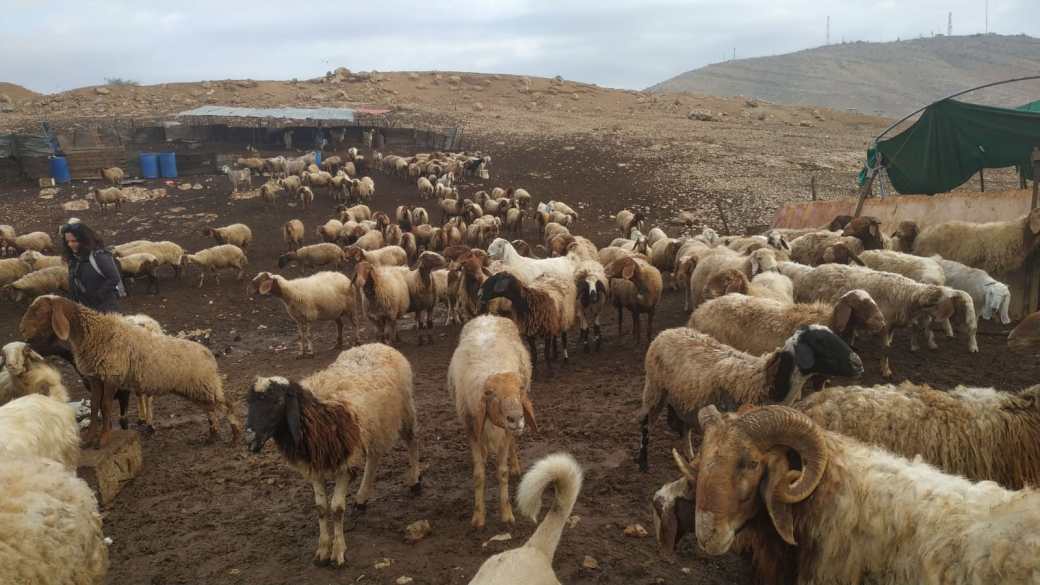It’s 8:00 on a winter morning as we arrive in South Hebron, and immediately there is a call: settlers attacking in Tuba. Five of us—Guy, Yigal, Noah, Yossi, me—tear off over the gravel-and-goat paths , through the desert, to Tuba. Guy is driving as if he were flying a plane or flogging a horse. The car careens over the rocks, kicking up dust. They need us. Now.
Continue readingTa’ayush
Al-‘Auja. October 22, 2021. Text by David Shulman
Abu Isma‘il says: “How long can a person live? Sixty used to be old. [Abu Isma‘il is 62.] Let’s say that today people live till seventy or eighty. It’s not very long. Why would anyone waste his little lease on life by stealing from others, by inflicting pain? By giving in to greed? Filastin, this land, used to be paradise, jannah. Allah created it as the jannah. Even now—just look around—it would be paradise, fruitful, peaceful, gracious, if only the settlers and the soldiers…..”
Continue readingAugust 20, 2021. Dir Jarir. Text and Photographs: David Shulman

Dawn at Dir Jarir. One herd of sheep is already out on the hills with Khairi’s son. They’re grazing not so far from the noxious outpost of Maaleh Ahuvia, but for now things are quiet. No settlers in sight. That sentence reveals the story of Dir Jarir. Dawn, noon, dusk, midnight, and all the hours in between– demented teenage settlers can turn up at any moment, in the Palestinian fields, in their makeshift tents, and even in their homes. They threaten and bully them, often they beat them, and always they invade their fields, vineyards, olive groves, and grazing grounds, wreaking havoc. The shepherds and farmers live in a state of terror, and the apparatus of the State is unwilling to intervene. There are good reasons to think that the army in the area stands with the settlers. The police are reluctant to come to Dir Jarir without an army escort.
Continue readingJuly 18, 2021. The 9th of Av. Ras at-Tin and Humsa. David Shulman

For miles around Ras at-Tin there is little but rocks, empty hills, yellow grass, and a few passing clouds, except for a dusty rock quarry about two miles to the west named for the settlement Kochav Hashahar. The closest settler outpost is the ironically named Malachei Hashalom, “Angels of Peace,” the tormenters of Ein Rashshash. Sometimes, in their spare time, they also harass the people of Ras at-Tin– a small community of Bedouin shepherds, about 120 souls, leading their lives, hurting no one. Lots of children. Lots of sheep. Lots of fiery sun.
Continue readingJune 11, 2021: Taybeh Junction. Texts and Photographs: David Shulman
April 24, 2021. Homra, text: David Shulman
I am not sure I can find the words for what we went through today.
Continue readingAfter Ten Years at Umm Al-‘Ara’is, March 13, 2021 (texts: Margaret Olin and David Shulman)
1. Why wasn’t I there? (Olin)
It can feel like you’ve been hired as an extra chaperone at a children’s party. On most Saturdays in Um Safa, Sa‘id ‘Awad packs his wife Rima and six, seven, or eight of his fourteen children into his lively SUV, all of them bumping and bouncing on the uneven roads. After a short hike to the family’s fields in Wadi Al-‘Ara’is, the soccer games begin.
Continue readingTaybeh Junction, March 5, 2021
This time there’s a twist to the story.

Taybeh: the fertile wadi, Irish-green after the rains, plowed and sown with seed along with another flat stony stretch at the top of the hill—maybe 1000 dunams altogether (250 acres), enough to keep several families and their herds going for some months. The land belongs to several private Palestinian owners in the village; they rent it out to Bedouins who live there in the spring and summer, grazing their sheep and harvesting whatever is left of the crops after the settlers and their herds have gotten to them. Last year the Palestinians lost tens of thousands of shekels because of these depredations. Just yesterday one settler boy-man hit Arik hard on the head with a club, splitting in two the helmet Arik was fortunately wearing.
Continue readingEzra Nawi, 1952 – 2021 text: David Shulman, photographs: Margaret Olin
Ezra Nawi. A Baghdadi Jew, born in Israel, fluent in Arabic. A man like and unlike all others.
Continue readingNovember 6, 2020. Harat Makhul. Humsa al-Foqa. Text by David Shulman
1.

The rains have come in force, the hills are muddy, and there is food for the goats and sheep. Over morning tea in Makhul we get the weekly litany of hurts. Walid—still a boy—was out alone with the herd, and settlers came and beat him. It’s really dangerous to be alone on the hills. A large posse of settlers attacked Qadri and several others; there were two broken legs. A few days earlier, settlers killed Qadri’s uncle’s cow.
Continue reading





